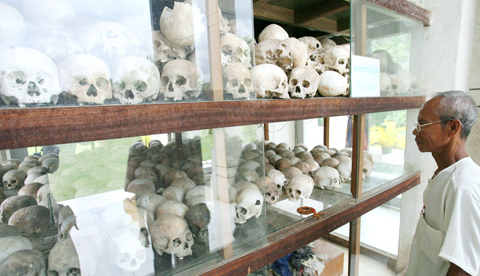Khmer Rouge torturer-in-chief Duch once taught math to school children, but put his cold, calculating mind to far more devastating use as head of a jail from which few inmates ever came out alive.
The 67-year-old — whose real name is Kaing Guek Eav — oversaw the extermination of some 15,000 men, women and children at the Tuol Sleng prison in Cambodia’s capital during the communist regime’s brutal 1975 to 1979 rule.
Those who worked under him at the prison testified that Duch was universally feared by the staff.

PHOTO: EPA
Most who worked there were uneducated teenage boys, whom Duch said could be easily indoctrinated because they were “like a blank piece of paper.”
“Comrade” Duch begged for forgiveness at Cambodia’s UN-backed war crimes court for crimes committed under his command at the jail, where prisoners were tortured into denouncing themselves and others as foreign spies.
As a staunch communist, then a born-again Christian and finally remorseful defendant, Duch seemed to always strive to please those above him, making his request to be released all the more surprising.
“He is meticulous, conscientious, control-oriented, attentive to detail and seeks recognition from his superiors,” a psychological examination released by the UN-backed court said.
Born in 1942 in central Cambodia, Duch is remembered as a sincere teacher devoted to helping the poor before he became a Khmer Rouge cadre in 1970.
The decision to join the communist guerrilla movement was influenced by one of his high school instructors who also enlisted, but would later be executed at Tuol Sleng as a suspected traitor.
“I joined the revolution in order to transform society, to oppose the government, to oppose torture,” Duch said during his trial. “I sacrificed everything for the revolution, sincerely and absolutely.”
Inside the rebel-controlled zones, he chose Duch as his revolutionary name because it was used by a model student in a schoolbook from his youth. He then oversaw a series of jungle prisons before being made head of Tuol Sleng after the regime seized the capital in 1975.
What began as only a few dozen prisoners turned into a daily torrent of condemned coming through Tuol Sleng, or S-21, as the regime purged itself of its “enemies.”
Ever meticulous, Duch built up a huge archive of photos, confessions and other documents with which prosecutors traced the final horrible months of thousands of inmates’ lives.
Following the Khmer Rouge’s fall from power, he maintained posts within the communist movement as it battled Vietnam-backed troops.
He also reportedly worked in the 1980s for Radio China and later taught English and math in at least one refugee camp. After his wife was murdered in 1995, Duch turned to Christianity.
He was arrested after Irish photojournalist Nic Dunlop uncovered him working for a Christian aid agency in western Cambodia under a false name. Before that, many had long assumed he was dead following his disappearance after Vietnamese troops ousted the Khmer Rouge in 1979.
“I told Nic Dunlop, ‘Christ brought you to meet me,’” Duch told his trial. “I said, ‘Before I used to serve human beings, but now I serve God.’”

DISASTER: The Bangladesh Meteorological Department recorded a magnitude 5.7 and tremors reached as far as Kolkata, India, more than 300km away from the epicenter A powerful earthquake struck Bangladesh yesterday outside the crowded capital, Dhaka, killing at least five people and injuring about a hundred, the government said. The magnitude 5.5 quake struck at 10:38am near Narsingdi, Bangladesh, about 33km from Dhaka, the US Geological Survey (USGS) said. The earthquake sparked fear and chaos with many in the Muslim-majority nation of 170 million people at home on their day off. AFP reporters in Dhaka said they saw people weeping in the streets while others appeared shocked. Bangladesh Interim Leader Muhammad Yunus expressed his “deep shock and sorrow over the news of casualties in various districts.” At least five people,

ON THE LAM: The Brazilian Supreme Court said that the former president tried to burn his ankle monitor off as part of an attempt to orchestrate his escape from Brazil Former Brazilian president Jair Bolsonaro — under house arrest while he appeals a conviction for a foiled coup attempt — was taken into custody on Saturday after the Brazilian Supreme Court deemed him a high flight risk. The court said the far-right firebrand — who was sentenced to 27 years in prison over a scheme to stop Brazilian President Luiz Inacio Lula da Silva from taking office after the 2022 elections — had attempted to disable his ankle monitor to flee. Supreme Court judge Alexandre de Moraes said Bolsonaro’s detention was a preventive measure as final appeals play out. In a video made

It is one of the world’s most famous unsolved codes whose answer could sell for a fortune — but two US friends say they have already found the secret hidden by Kryptos. The S-shaped copper sculpture has baffled cryptography enthusiasts since its 1990 installation on the grounds of the CIA headquarters in Virginia, with three of its four messages deciphered so far. Yet K4, the final passage, has kept codebreakers scratching their heads. Sculptor Jim Sanborn, 80, has been so overwhelmed by guesses that he started charging US$50 for each response. Sanborn in August announced he would auction the 97-character solution to K4

SHOW OF FORCE: The US has held nine multilateral drills near Guam in the past four months, which Australia said was important to deter coercion in the region Five Chinese research vessels, including ships used for space and missile tracking and underwater mapping, were active in the northwest Pacific last month, as the US stepped up military exercises, data compiled by a Guam-based group shows. Rapid militarization in the northern Pacific gets insufficient attention, the Pacific Center for Island Security said, adding that it makes island populations a potential target in any great-power conflict. “If you look at the number of US and bilateral and multilateral exercises, there is a lot of activity,” Leland Bettis, the director of the group that seeks to flag regional security risks, said in an